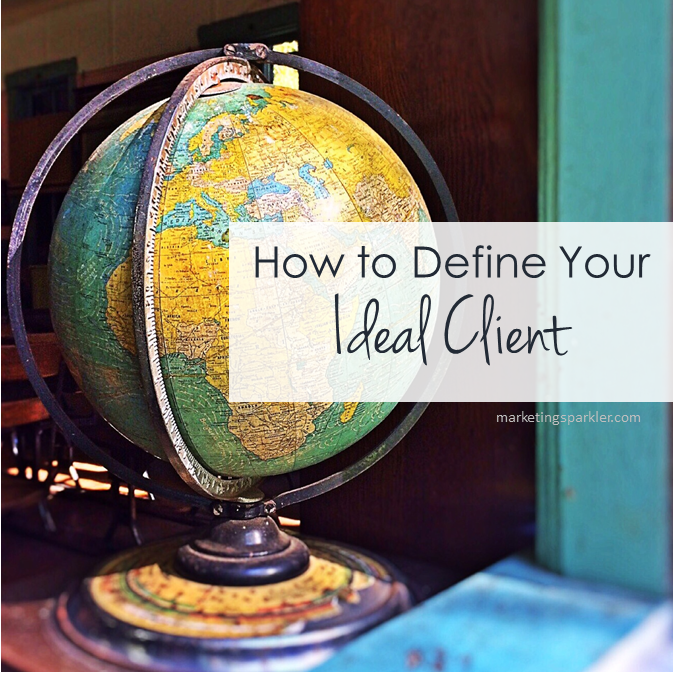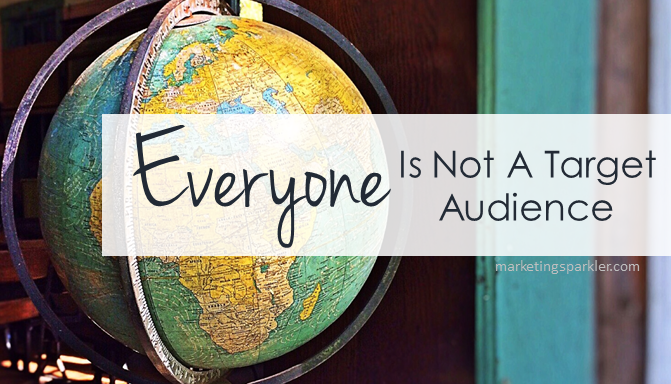If someone asked you to describe your ideal client, what would your description consist of, beyond the typical demographics like gender and age?
Would your answer include additional demographic-type factors, such as:
- Educational level
- Annual income
- Family situation
- Geographic location
- Residence type
- Years of experience in their field
- Favorite magazines
- Their <insert your niche> idols
- Favorite places to shop for <insert your service here>
If you’ve worked on identifying your ideal client, you will likely be able to answer at least some of the questions about the demo of your ideal client.
Therefore, this article is NOT going to talk about answering these common target-client questions, for 2 reasons.
First, you can research countless articles that will provide similar lists of criteria that you will use to define an ideal client. (Note: those common lists will include all of the above.) Next, said articles will tell you to create an ideal client profile, then perform some market research, test out some services, and assess success and results. Then curate all of this data into a nice, neat client profile.
Second, because there are additional criteria to consider, more depth to identifying your ideal client. It’s not that simple. So let’s talk about the additional criteria.
Better yet, let’s talk about the factors that matter:
Are you meeting them where they are to actively engage in the conversation, provide insight, and brand yourself as the authority?
How to Define Your Ideal Client
Defining your ideal client can happen in a variety of ways. The best way is to decide who they are prior to creating a product or developing your services. But, many people do it the other way successfully; it’s just a little more difficult.
Before we get started, let’s address the elephant in the room.
Your product/service may appeal to a broad range of people. People of different ages and backgrounds. And you may feel like you shouldn’t have to define your ideal client, pick a target audience, or niche down because you can serve soooo many people.
While all of this may be true, here’s the reason why you must define your ideal client:
“Everyone” is not a target market strategy.
No matter how many people can benefit from your products/services, you need to define an ideal client so that you can FOCUS your marketing efforts to reach that one person. Trying to reach that ONE person, your ideal client, will help you to shape your sales language, tailor your brand, and position yourself as a solution. Focus is a blueprint.
For example, you think your services appeal to women ages 25 and up. Ok, cool. But, in your marketing language, do you talk (and market to) a 25 year old single, subway ridin urban dweller the same way you talk to a 42 year suburban minivan driving mother of teenagers? Heck no! You would use different marketing language, cultural references, pain points, branding, and imagery, right? Yup! That my friend is why you must identify your ideal client. So your message resonates and connects.
Ok, back to the task at hand. As you are working toward defining your ideal client, ask yourself the following questions.
Who do you really want to work with?
It’s important to know the type of people you want work with. Write down your ideal candidate and leave nothing out. You want this to be your perfect, ideal customer that would exist in a perfect world. Do you want to work with life coaches who earn six figures? Do you want to work with stay at home mothers who are trying to start small businesses of their own? Do you want to work with early adopters or people who are afraid of technology? It’s up to you who the customer is.
[Tweet “How to Define Your Ideal Client: Who do you really want to work with?”]
What problems can you solve?
When you define who your ideal client is, ask yourself, what problems can you solve for them? Can you get them more organized and help them streamline their processes? Can you teach them something that they need to know to be successful? Do you have a product that solves a problem such as helping them accomplish a task easier, or providing them with more energy throughout the day? List their problems; list your solutions.
Do you have a specific geographical location you want to serve?
In many cases, with online marketing your thoughts automatically go to serving the global community as a whole. But, you probably should narrow it down to “English speaking” or American or Canadian or something else entirely. Maybe you realize as you’re studying the issue that your clients and customers live in your own town, or maybe you realize they live in many towns all over the world, but are English speakers.
How much money do you need to earn?
This may seem like a strange question but it’s an important determination on whether or not your chosen client base, and the products and services you want to provide, will generate the income you need. If you’re only capable of producing products or services for a finite amount of people at a particular price, this becomes very important.
[Tweet “When defining your ideal client, you need to know how much money you want to earn.”]
How much disposable money does your ideal client earn?
If your clients and customers cannot afford to buy what you’re selling then you’ll have trouble meeting your goals. Determine in advance what type of money they can afford to spend. Figure out what type of quality of products and or services they are expecting for that amount of money.
What types of clients do you absolutely NOT want to work with?
As important as it is to know with whom you want to work, it’s also important to know the types of people you absolutely do not want to work with. This doesn’t mean that you are shunning them; it only means that they’re not right for you. Keeping the door closed to those whom aren’t right for you helps you leave room for those who are.
[Tweet “Knowing the clients you WANT to work with is just as important as knowing who you do NOT want to work with.”]
What types of business do your ideal clients participate in?
Do your ideal clients already have their own business, or do they work for a business? Does your ideal client buy from your competitors? If so, why do they choose to buy from them? Knowing the activities of your ideal client is an important way to get closer to them so that you can be a resource to them.
What are your core values and how will you align your business with those?
These can be very personal values and ethics, and what you want your business and brand to represent to the public. They can also be only related to your business – it’s up to you. If you can match your values, and your business’s values with your clients’ values, you’ll have a perfect match that will help you match up your marketing efforts to attract the right customers.
The big lesson here is that if you work with and sell to only people that you want to be around, like, and care about emotionally, you’ll have a much better business model to work with. You’ll be able to stick with this ideal client long-term, building solid relationships, and continue to solve their problems and fill their needs.
Action Item
If you can clearly define your ideal client, finding them online or offline won’t nearly be as cumbersome than if you cast a wide “every man, woman, and child” fishing line approach to finding your customer.
Action item: Take 20 minutes and see if you can develop a profile of your ideal client, based on answering the questions above. Then compare this profile to your marketing efforts. Do these sync or is there a disconnect?
Ciao,
Miss Kemya




It’s surprising for me to hear that most people don’t even think about how their ideal client looks like. If more business owners would really think about this, so many more businesses would thrive. Once you know what your ideal client looks like you can easily find the places where he/she is found and then create perfect partnerships where your client receives the best possible work/product/service.
Well said, Graham! Understanding your ideal client makes the entire marketing process much easier to execute. Thanks for commenting